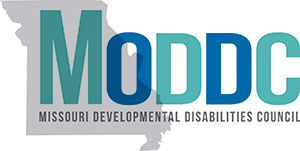Missouri Developmental Disabilities Council's Position Digital Divide
Technology like computers, smartphones, and fast internet let people do all kinds of things. More and more, people need these technologies to take part in society. People who don’t have these things might:
- Lose touch with friends, family, and their communities
- Lose supports and services
- Not be able to get the healthcare they need
We call this problem the “digital divide”. The digital divide is a problem in Missouri and across the United States. It is especially a problem for people with disabilities. So, Missouri must make sure everyone can get computers, smartphones, and fast internet.
Why is the digital divide important?
Fast internet, smartphones, and computers have changed the way we live our lives. People use these technologies to:
- Keep in touch with friends and families
- See their doctors
- Manage their money
But not everybody is able to get these technologies. People without them can feel cut-off and left out. Studies have shown they have worse physical and mental health.
Some people can’t get the technology they need.
For example, someone may not be able to afford a smartphone.
Others have technology but don’t know how to use it.
For example, someone may have trouble setting up the internet on their computer.
The digital divide affects people with disabilities more than others. One study looked at how people with and without disabilities use technology. It found out that people with disabilities are less likely to have a computer, smartphone, or fast internet.
This problem is worse for people who live in rural areas. People there are 15 times more likely to not have these technologies.
The digital divide is worse in Missouri than most of the United States. Missouri ranks 32nd in the U.S. in being able to get fast internet. It is in the bottom five states for being able to get low-cost internet. One in 4 Missouri students don’t have the technology that they need. Over 250 Local Educational Agencies said that cost was a problem for their students.
Public and private groups in Missouri have spent millions of dollars to try and fix the digital divide. Groups have also tried to train people on how to get and use technology. But the digital divide is still a big problem, and more needs to be done.
What should Missouri do about the digital divide?
Technology like laptops, smartphones, and fast internet used to be rare. Now, they are something that everybody needs to take part in society. When people don’t have them, they have less chances to:
- Learn
- Get medical care
- Work
- Manage their money
- Get social services and other programs meant to help them
Missouri should understand that everyone needs these technologies. Without them, people get left behind. Here are some things Missouri can do to work on fixing the digital divide:
- Public and private groups must keep working to get fast internet for all Missourians. They should give extra attention to rural areas.
- Groups in Missouri should help teach people to use computers, smartphones, and the internet. Groups should help teach people with disabilities all the ways these tools can help them. Groups should help more people with disabilities get and use these technologies.
- Students with disabilities need to learn about technology and how to use it. Some groups are already working to make this happen. All groups in Missouri should help with this work.
- Sometimes, Missouri state groups have computers, smartphones, and tablets they aren’t using. They should give these devices to people who need them for cheap or free.
- Missouri has many places and programs to help people get and use technology. Some of these places are:
- Schools
- Libraries
- Missouri Assistive Technology
Missouri should make sure people know about these programs and how to use them.
- Some students do not have a good way to get internet. Missouri schools should have wireless internet for students to use while they’re at school.
- It will take time before all Missourians have fair and equal access to technology. Until then, Missouri must let people do things in person, by phone, or by mail.

